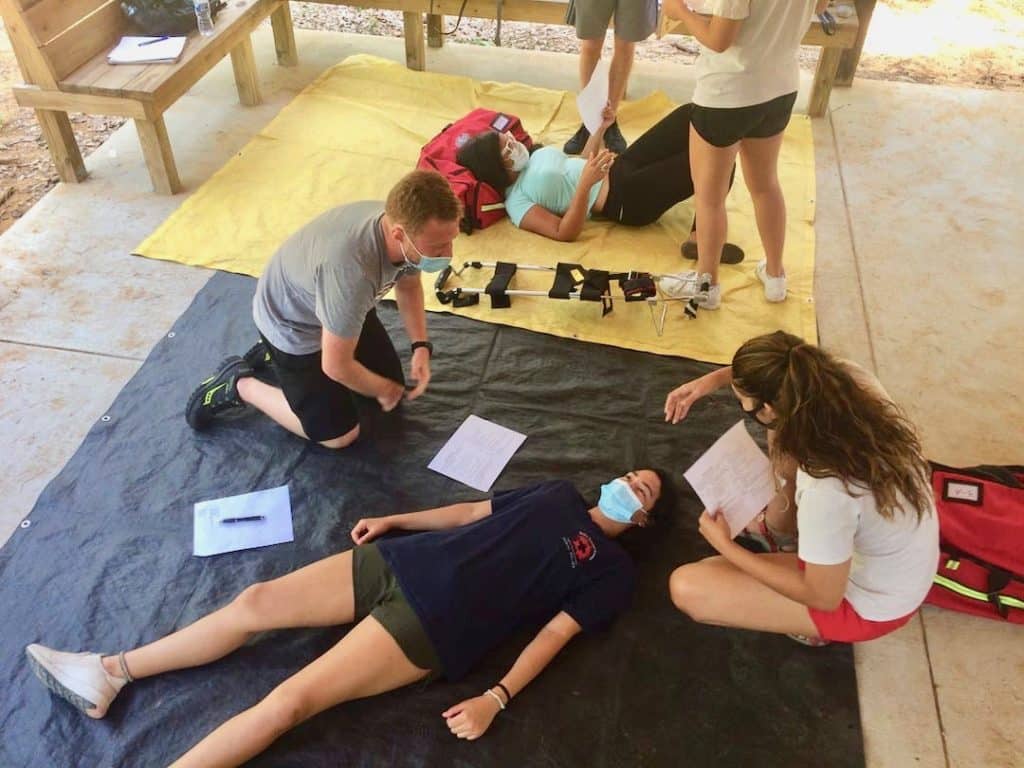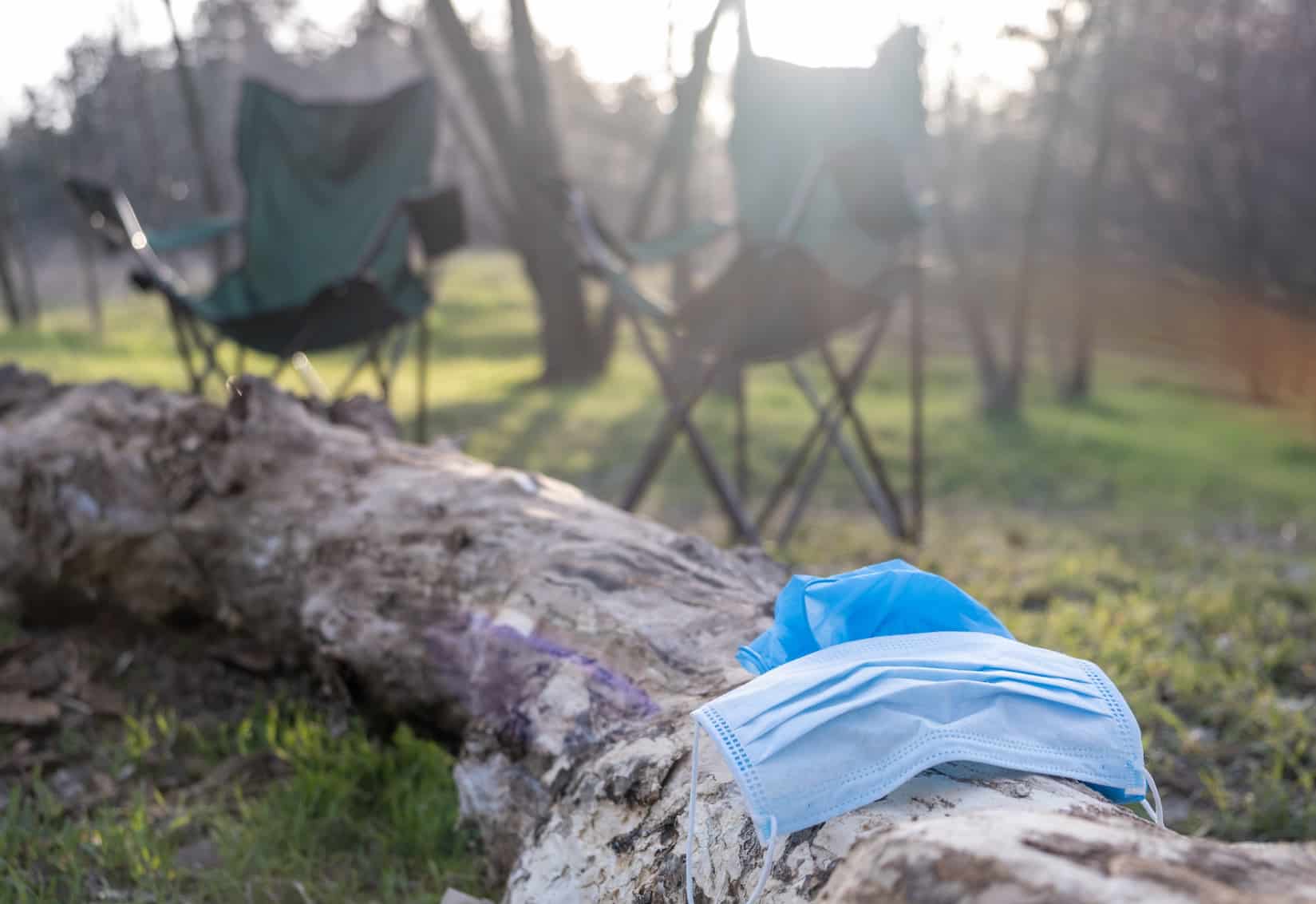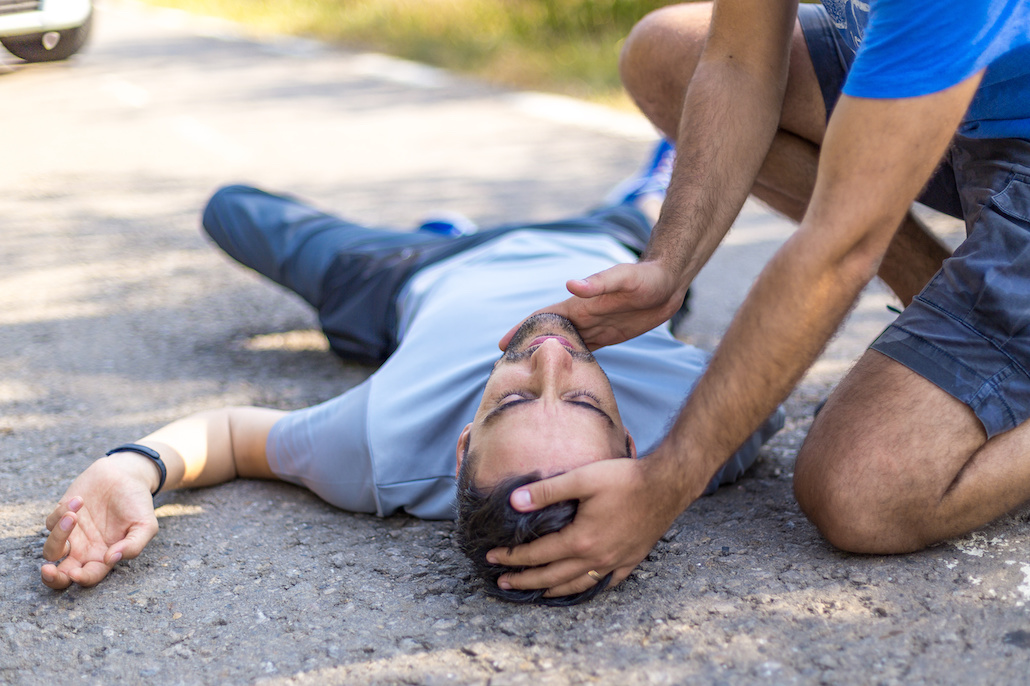Celebrating 2024: A Year of Growth, Innovation, and Milestones at NCOAE
Life At NCOAEThe year 2024 was another great one for The National Center for Outdoor & Adventure Education (NCOAE). From groundbreaking program launches to prestigious accreditations, we’ve continued to grow, innovate, and strengthen our commitment to education and adventure. Here’s a look at our top milestones from 2024:
Celebrating 15 Years of Excellence
In 2024, we celebrated a major milestone: our 15th anniversary. Over the past decade and a half, NCOAE has grown from a vision into a leading outdoor education and adventure programming organization, impacting thousands of lives through our innovative programs. This achievement reflects the passion, dedication, and trust of our community, as well as the vision of our founders and faculty and staff that continue to buy into the NCOAE educational framework.
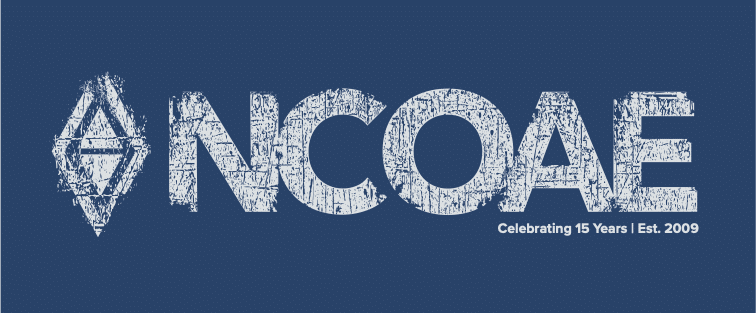
Here’s to the next 15 years of adventure and growth!
Cognia Accreditation
This year, we learned that our accreditation from Cognia — an esteemed global organization representing the largest network of accredited institutions — is in its final stage of approval. Cognia is comprised of three of the six U.S. recognized regional accrediting agencies, including the Southern Association of Colleges and Schools Council on Accreditation and School Improvement (SACS CASI), the North Central Association Commission on Accreditation and School Improvement (NCA CASI), and the Northwest Accreditation Commission (NWAC). Together, they form the largest and most recognized community of accrediting institutions in the world.
For NCOAE, Cognia accreditation ensures our academic credits are recognized and transferable across schools nationwide and internationally. Cognia accreditation also underscores our commitment to delivering exceptional educational programs that empower students to achieve their academic objectives in non-traditional ways.
Expanding EMT Training to Idaho
We officially became a recognized Proprietary School in Idaho through the Idaho State Board of Education. Our new satellite camp in Idaho offers Hybrid EMT Training in a stunning wilderness setting, blending immersive, hands-on learning with state-of-the-art facilities. This expansion furthers our objective to make EMT certification accessible to more students.
Self-Paced EMT Certification
Speaking of EMT education that meets the needs of busy students and professionals, we launched our Self-Paced EMT Certification Course in North Carolina and Oregon. This flexible program allows students to gain life-saving skills on their schedule, combining rigorous coursework with real-world applications. It’s the perfect solution for anyone passionate about emergency response but balancing demanding commitments.
High School Semester Programming
In 2024, we finalized our plans for launching our first-ever High School Summer Semester, giving rising 10th and 11th graders a unique opportunity to earn academic credits while embarking on 32-day outdoor adventures in North Carolina, the Pacific Northwest, and Ecuador. With courses in honors Natural Science, Outdoor Leadership, and certifications in Wilderness Medicine, this program sets students up for success in education and life.
Sharing Our Story on the “It’s In the Experience” Podcast
Our co-founders Zac and Celine Adair shared their journey on the Association for Experiential Education’s (AEE) podcast, “It’s In the Experience.” In Episode 15, titled Overcoming Challenges: Creating Positive Experiences in Experiential Education, they reflected on NCOAE’s origins, challenges, and triumphs. The interview offers an inspiring glimpse into our mission and vision.
27 New Blog Posts
In 2024, we enhanced our online presence with 27 new blog posts, covering topics from outdoor education and adventure programming to emergency wilderness and urban medicine. Our blog continues to serve as a valuable resource for educators and students alike, providing insights into life in the outdoor and experiential education community.
As we look back on 2024, we’re filled with gratitude for the milestones we’ve achieved and the community that has supported us along the way. Together, we’re shaping the future of outdoor and adventure education — and we can’t wait to see what’s next.
Thank you for being part of our journey!
EMTs Come to the Rescue in Natural Disasters
Emergency MedicineThe morning of September 26, 2024, saw the peaceful mountain towns of western North Carolina waking up to their usual weather notifications. Even though the area was accustomed to storms, information about Hurricane Helene caused worry because it was growing stronger at a faster pace than anticipated.
The stronger the storm became, the greater the responsibilities of local Emergency Medical Technicians (EMTs). From organizing for the possibility of extensive evacuations to offering essential treatment in hazardous and uncertain settings, EMTs were at the ready.
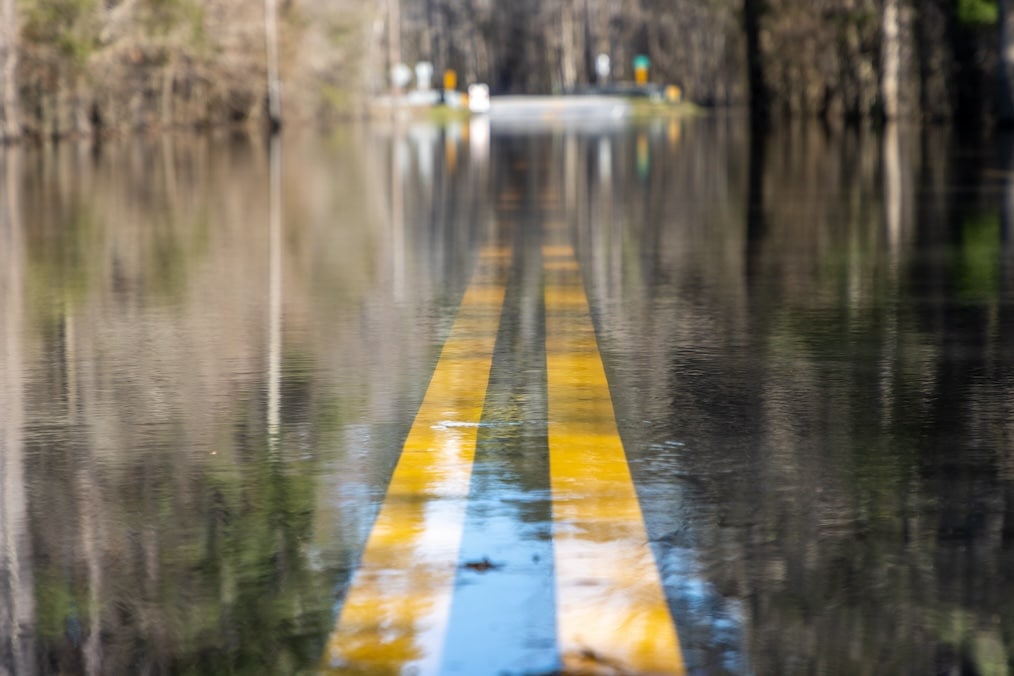
Two recent hurricanes — Helene and Milton — serve as stark reminders that natural disasters can strike with little warning, leaving a trail of chaos and devastation in their wake. Saving lives and keeping people safe during a disaster, and cleaning up in its aftermath, requires the coordinated efforts of a diverse army of professionals, including doctors, police, members of the military, heavy-equipment operators, carpenters, electricians, plumbers, and more.
Also on the front lines are EMTs, such as the ones we train here at The National Center for Outdoor & Adventure Education, typically serving as part of the local rescue response. National emergency services, including the military and larger medical teams, are usually dispatched later. But they also require the dedication and expertise of EMTs.
In this post, I explore the indispensable contributions of EMTs during natural disasters, highlighting their training, the challenges they face, and the profound impact they have on (more…)
Meet the NCOAE Student: Robert Fox, EMT Course Graduate
Student ProfilesWithin three weeks of graduating from the Intensive Hybrid EMT course offered by us here at The National Center for Outdoor and Adventure Education’s (NCOAE), Robert Fox had obtained his national and state emergency medical technician (EMT) licenses and had a job offer in hand at a local ambulance service.
Today, this Athens, Georgia, native works full time as an EMT. In addition — and in short order — Robert in on track to attend school to become an advanced emergency medical technician (AEMT) this fall. Advanced emergency medical techs provide basic and limited advanced emergency medical care and transportation for critical and emergent patients.
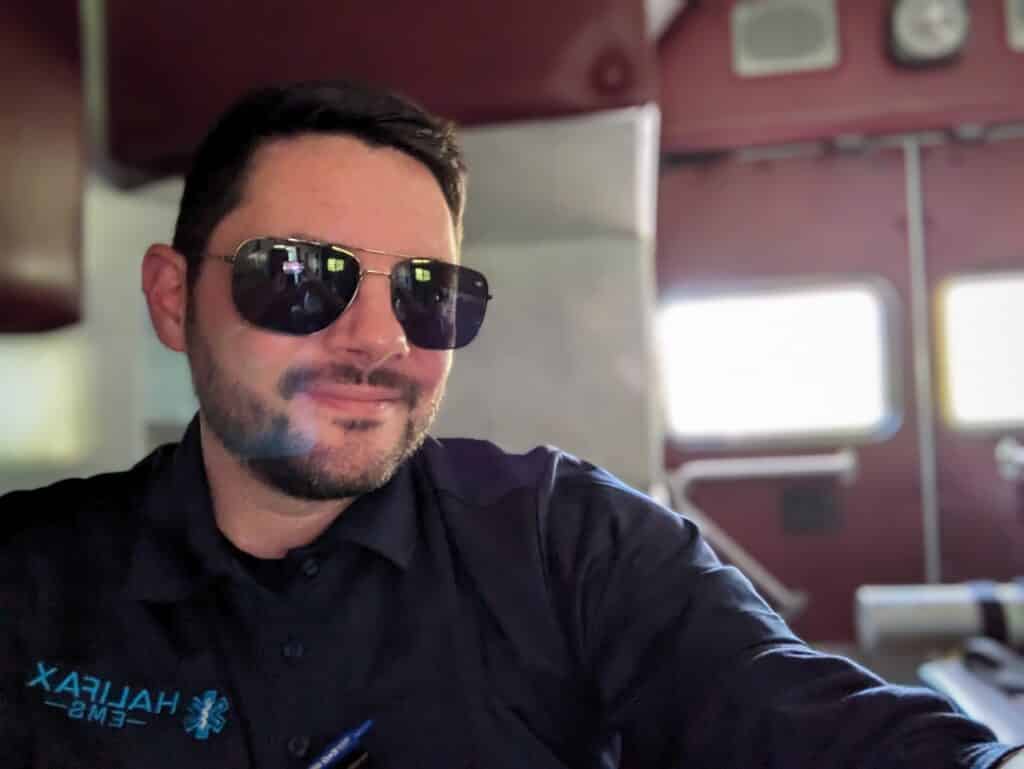
These advanced technicians possess the knowledge and skills necessary to provide patient care and transportation. And after that schooling? Robert is thinking about starting a paramedic program at a local community college.
So, what prompted such inspiration for our young graduate? Robert began his career as a senior wilderness guide, working in the field from 2007 to 2013. It was while taking a course to maintain his Wilderness First Responder certification that he became interested in more advanced emergency medical services (EMS).
But, sharing that the timing wasn’t right, Robert decided to work in behavioral health and criminal justice for (more…)
EMT Health and Fitness: How to Stay Physically Strong and Mentally Sharp
Emergency MedicineIt’s been my experience that emergency medical personnel — including Emergency Medical Technicians (EMTs) — tend to be much better at caring for others than for themselves. That’s generally the result of long shifts, life-or-death situations, and consistently helping people who are suffering the worst day of their lives. It’s going to take a toll.
To compound the problem, those who work in emergency medicine often neglect their own health and fitness. They forgo exercise, reach for junk food because it’s often handier. Or they begin to seek out various substances to get through the day. These might include energy drinks during their shift so they can remain alert. Or maybe a drink or three when they’re off the clock to calm their nerves and help them sleep.
Eventually, this unhealthy lifestyle catches up to them, negatively impacting their mood, energy, intimacy, and more.
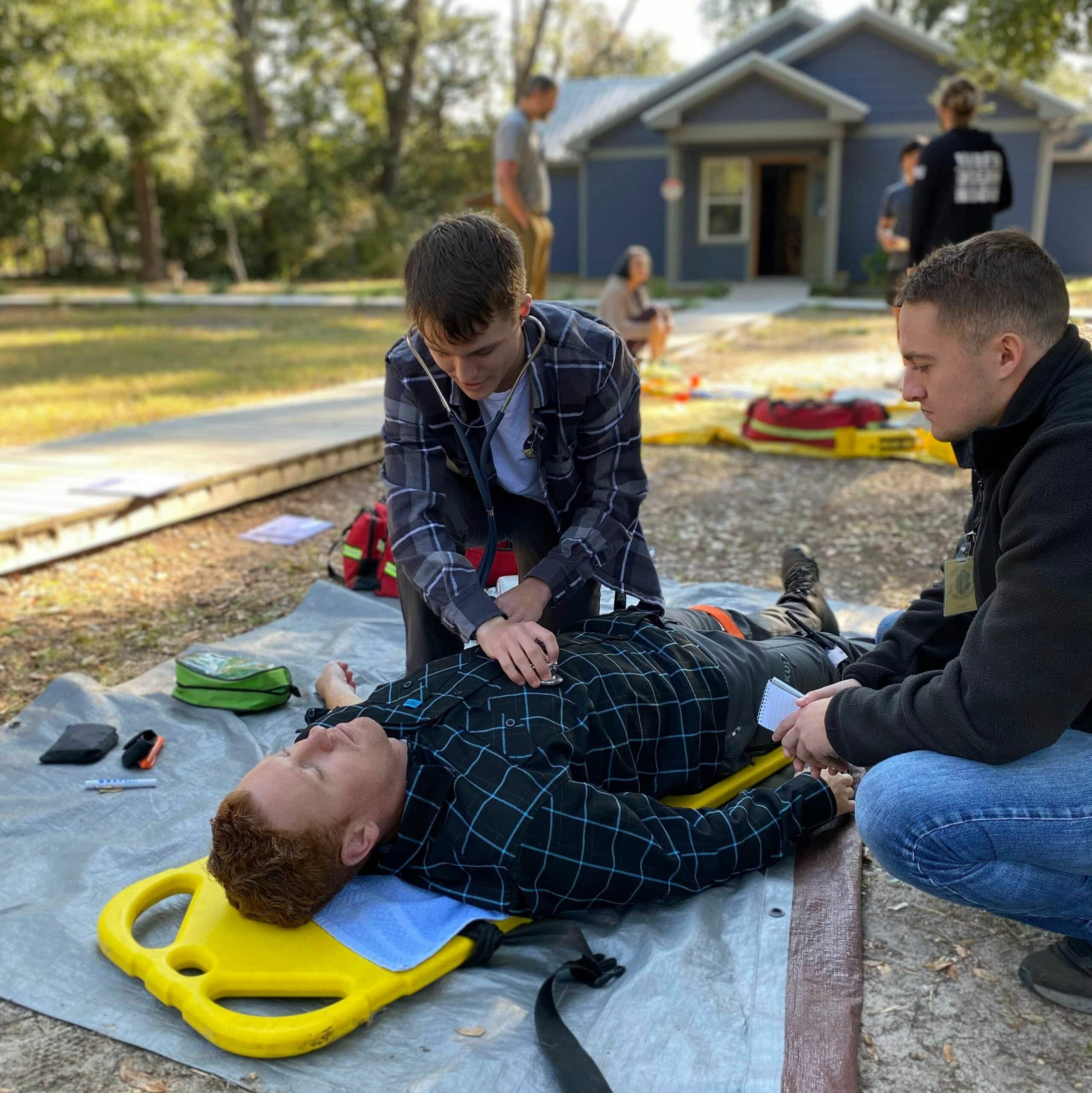
The multi-billion dollar a year health and fitness industry offers little in the way of relief for those in our field. And often overlooked is the overworked and stressed-out Emergency Medical Systems (EMS) shift worker.
If you’re a member of that demographic or you’re considering an EMT training and certification program like our Standard EMT, Hybrid EMT, or Wilderness EMT, don’t wait around in the hopes of that industry or even your own EMS unit will be reaching out to you. Make this your wake-up call. Now is the time to start focusing on your own health and fitness.
Remember the lesson you’re taught when you board an airplane — put your oxygen mask on first before helping anyone seated next to you with theirs. In the same way, you need to focus on your own health first in order to be healthy and fit enough to assist others when they’re experiencing a medical emergency. And continue that health regimen so you are healthy enough to make a lasting career in emergency medicine.
In this post, I provide practical advice on how to restore and maintain your own physical and mental health and fitness over the long haul.
Manage Stress
Stress kills. We are all well aware of its negative impact on health, but what we need to realize is that a great deal of our stress is self-inflicted. After all, we’re the only ones who can (more…)
Why Clinical Experience Matters in EMT Training
Emergency MedicineIn the world of emergency medical services (EMS), future EMTs and paramedics accept the reality that their immediate future includes hundreds of hours of lectures, extensive bookwork, and plenty of written tests.
Each of these students has an objective in mind for taking EMT training courses, and their reasons are many. Some are looking to start careers in the EMS profession. Others plan to use their EMT certification as a stepping stone to medical school or physician assistant (PA) school. And there are those who are uncertain about what direction their future might take, so they’re exploring their options.
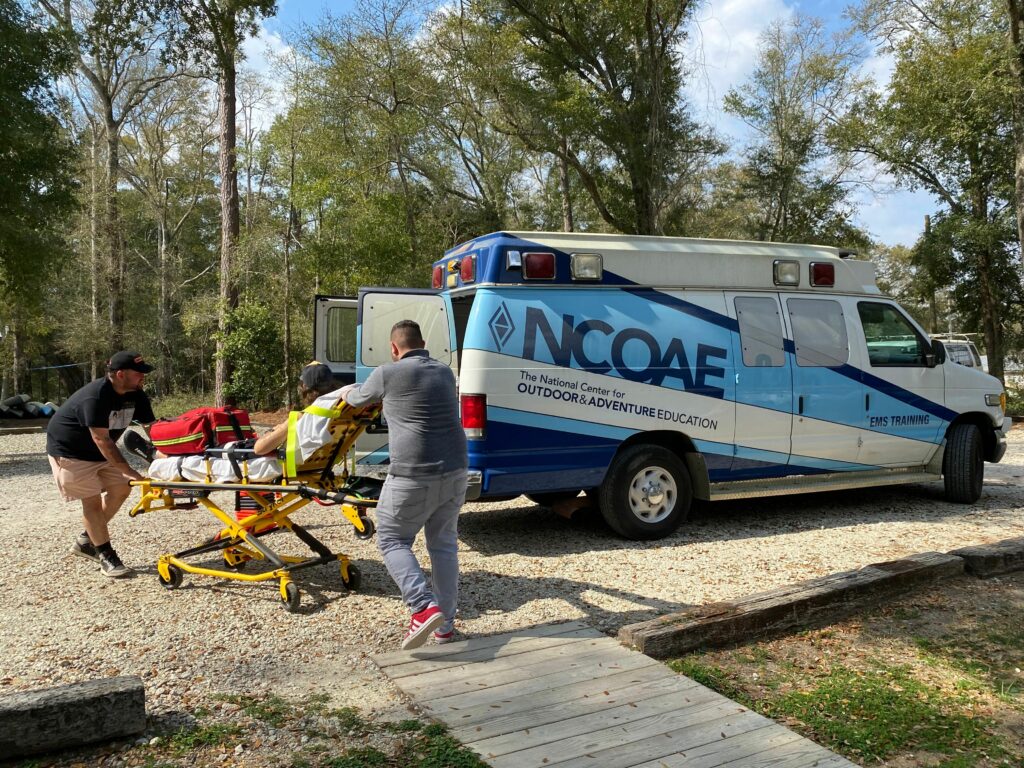
Regardless of the reason why, there are a number of things that simply can’t be “taught” in the classroom. Equally important as “book learning,” and perhaps more vital, is clinical and field experience. What is clinical experience? In the real world, clinical settings feature healthcare providers conducting actual exams and procedures on real patients. Physical examples might be a bustling hospital emergency department, a crowded local health clinic, or finding yourself hovering directly over an (more…)
Opinion: There’s Nothing “Basic” About an EMT
Emergency MedicineIt’s been more than a decade since the National Registry of Emergency Medical Technicians (NREMT) stopped using the certification designations EMT-B and EMT-Basic.
The change from EMT-B to EMT was not just in title. It was accompanied by an expanded set of knowledge and skill expectations for emergency medical technicians (EMTs). There is nothing “basic” about what an EMT learns or the skills he or she can perform. And they’re certainly not “Ambulance Drivers.”
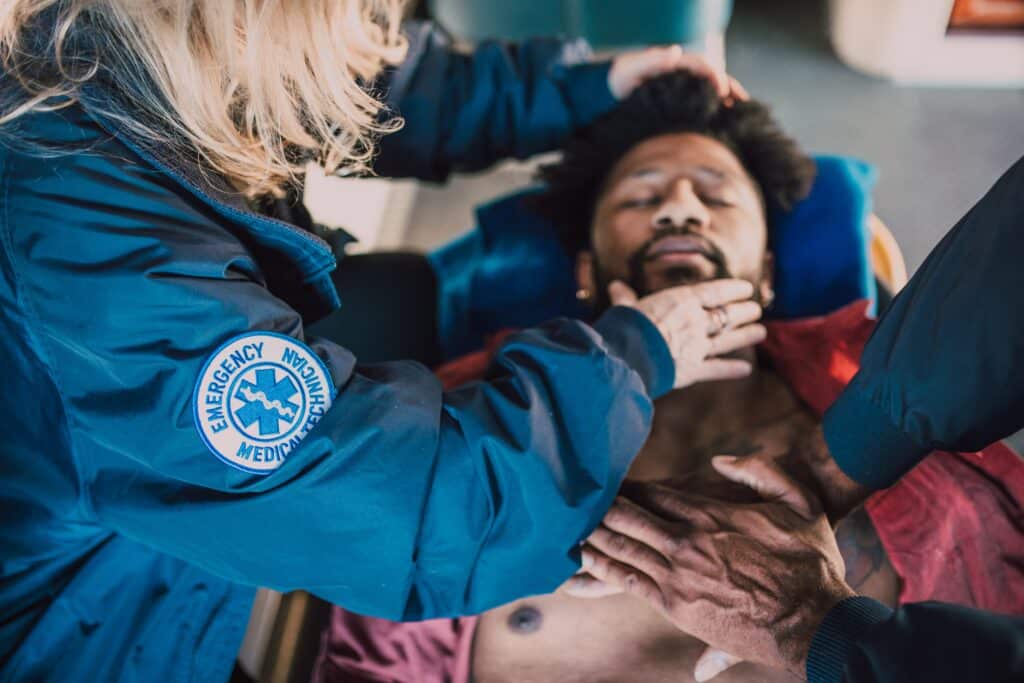
Most states have made the transition to the new title, but many emergency medical service (EMS) providers continue to refer to some EMTs as “Basics.” Maybe it’s out of ignorance, or just an antiquated habit, but we need that to stop. It’s much more than just an inaccurate designation — it’s misleading to the public and gives the wrong impression regarding care and capabilities.
Looking Back at EMT Designations
The early terminology came from a haphazard system of state-by-state naming conventions. The NREMT itself started out with an “EMT-Ambulance” or “EMT-A,” later adding an “EMT-Non-Ambulance” designation. As a result of this confusing (more…)
8 Alternative Jobs to Pursue with an EMT Certification
EMT TrainingJust obtaining an Emergency Medical Technician (EMT) license opens a world of career possibilities both inside and out of the medical field. Sure, you have to put in the effort, but the opportunities are as diverse as our EMT students here at The National Center for Outdoor & Adventure Education (NCOAE).
Fact is, we receive applications from students from all walks and stages of life, who successfully complete our EMT training program and go on to use that EMT training for a variety of opportunities. Some become full- or part-time EMTs, others use this outstanding training and education as a steppingstone for medical or nursing school. And then there are the outdoor enthusiasts who use this EMT training to become Ski Patrollers or members of Search and Rescue crews, or to add an additional layer of medical expertise when guiding groups on mountaineering and backcountry expeditions.
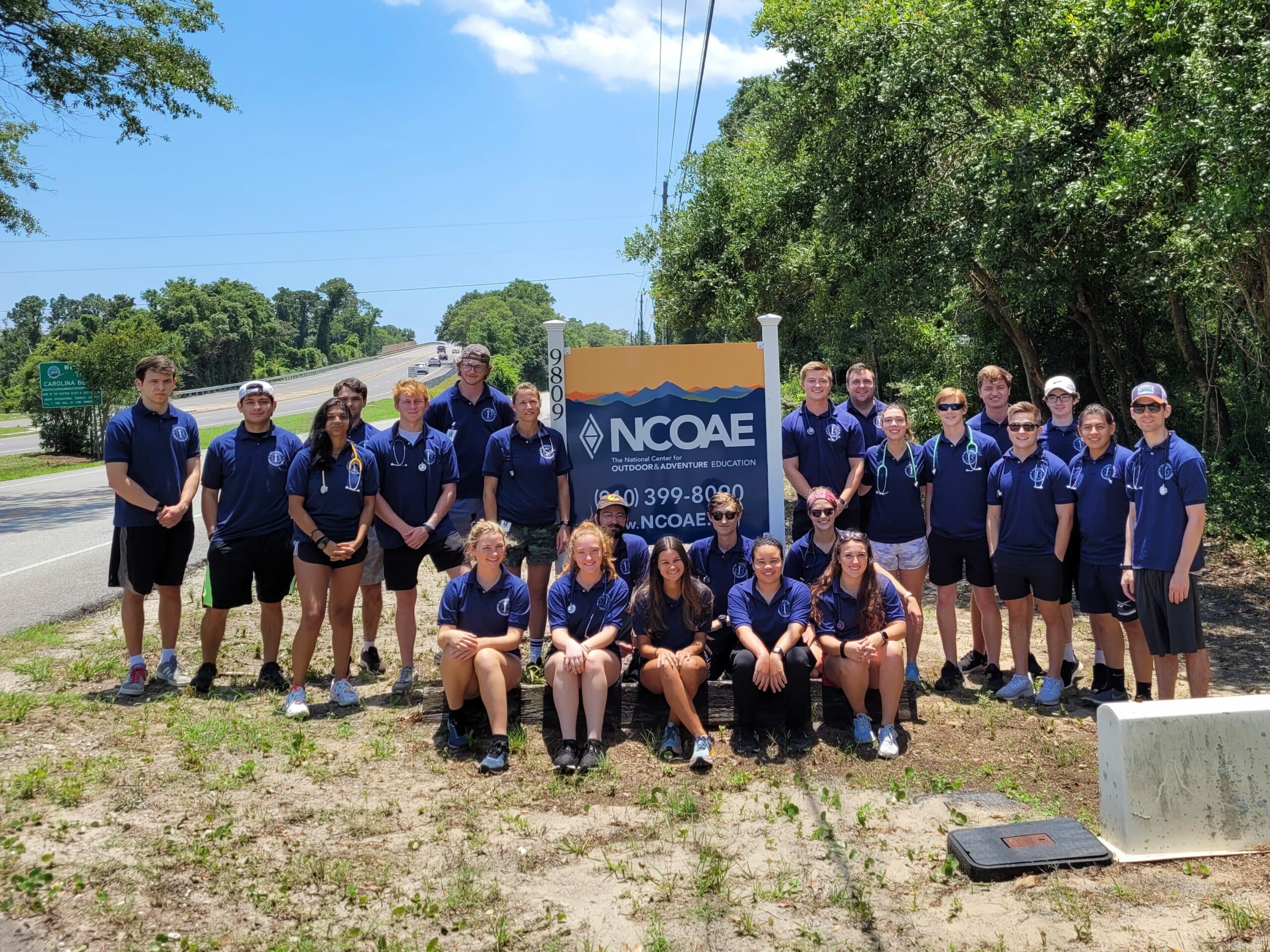
Maybe you’ve been an EMT for a while and are looking for a change, Or maybe you’re thinking about obtaining your EMT certification and then consider your options. While the most popular career trajectory for EMTs is to become a Paramedic, there are a number of jobs that you can obtain with just an EMT certification, keeping mind that some may require additional training.
Here are eight such opportunities: (more…)
Most EMS Terminology Comes Down to Initials, Abbreviations and Acronyms
EMT TrainingA few years ago, we ran a three-part series on slogans, slang, and terminology as it applies to a trio of human-powered outdoor recreational activities. If you recall, we started out with some “gnarly” surfing terms, then we “tied in” to a conversation about climbing, finally pulling a “wet exit” on the language of paddling.
You can review these three articles using the links below:
- From Sept. 20, 2020: Surfing Terminology and Slang: You Can’t Play BINGO Without the Lingo
- From Oct. 10, 2020: On Belay — Climbing Terminology and Slang
- From Oct. 30, 2020: Paddling Terminology and Slang: Nobody Says ‘Up a River Without an Oar’
There was quite a bit of word whimsy in those articles, and we made sure to remind readers that successfully lassoing the linguistics of a particular activity was no guarantee you were mastering that particular sport professionally.
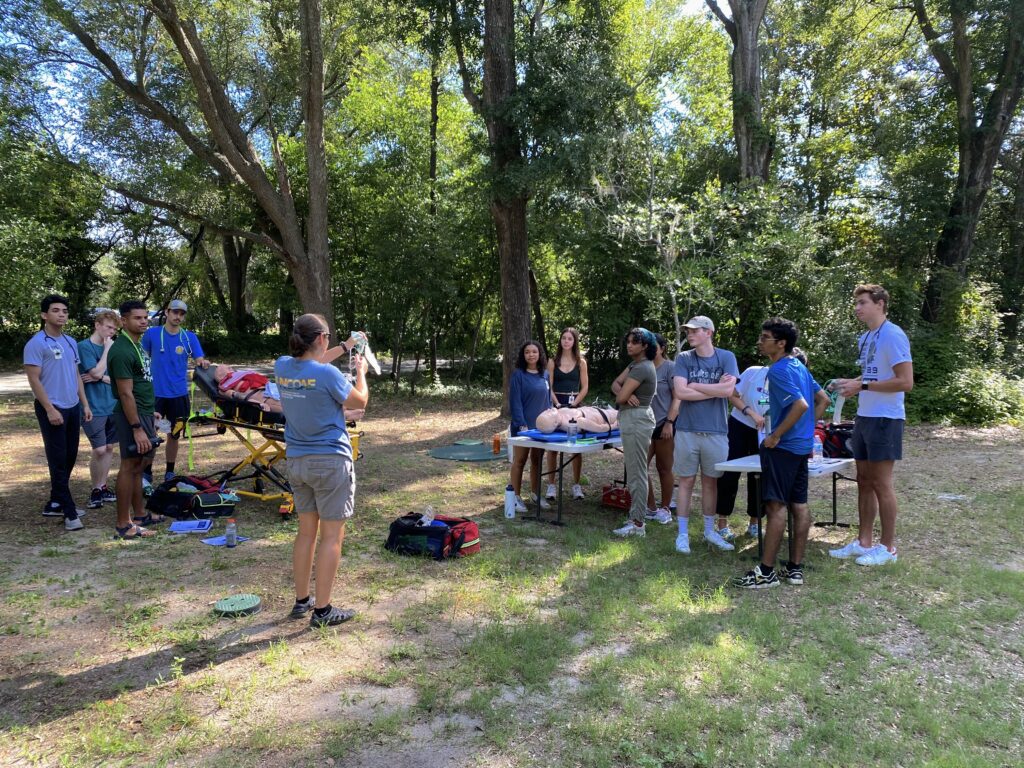
Today we’re taking a more serious look at language, this time highlighting the terminology used by members of the Emergency Medical Service (EMS) community. That’s because one of our areas of focus here at The National Center for Outdoor & Adventure Education (NCOAE) is emergency medicine training and education. And whether you’re an EMS, medical professional, or wilderness first responder (WFR), these terms are most often employed when these professionals find themselves managing a medical emergency.
First off, you might notice that most of these terms come in the form of acronyms, abbreviations, and initials, and the reason for that is to enable first responders to quickly communicate and react with each other and the patient in the field.
The source for these acronyms comes from the NCOAE Wilderness Medicine Field Guide (ISBN 978-0-578-87449-4).
Here, we present them in alphabetical order: (more…)
NCOAE’s EMT Training Opens the Doors to Jobs Across the U.S.
EMT TrainingApplicants to our nationally renowned EMT training courses often ask us if they can take
their new EMT credentials to the state where they live, and the answer is mostly yes.
The National Center for Outdoor and Adventure Education’s (NCOAE) campus is
located in North Carolina, where we offer 21-day “Intensive” EMT-Basic and 23-day
“Intensive” Advanced EMT training courses among others. Successful completion of
these courses authorize our graduates to take the National Registry of Emergency
Medical Technicians (NREMT) exam.
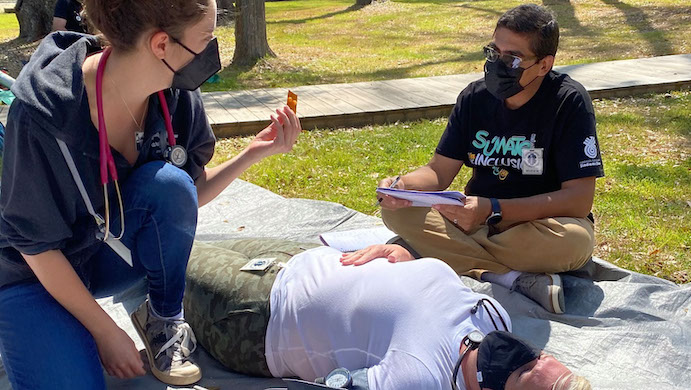
National Registry Certification examinations evaluate the competence of EMS
practitioners at a variety of levels, including Emergency Medical Responder (EMR),
Emergency Medical Technician (EMT), Advanced Emergency Medical Technician
(AEMT), and Paramedic.
NREMT credentials are either required for an initial license or accepted for legal
recognition or reciprocity in all 50 states and Puerto Rico. That makes it easier to
maintain
Thinking About Going to Med School? Start with EMT Training and Certification
EMT TrainingIf one of your goals is to apply to medical school and eventually become a doctor, here are a few of the hurdles you’ll need to jump through. First, you’ll need a four-year Bachelor of Science degree with a minimum 3.0 GPA, a passing score on the MCAT exam, and a few glowing letters of recommendation.
But how would you like to increase your odds of getting admitted and succeeding in med school? If so, you may also want to consider getting trained and certified as an emergency medical technician (EMT) and gaining some valuable experience in the field first.
According to a survey of 67 medical schools in the United States and Canada, 85 percent of those schools responded favorably to applicants with experience as EMTs or paramedics. That’s not exactly surprising. After all, EMTs have real-world experience in the medical field.
In this post, we highlight the advantages of obtaining EMT training and experience prior to applying for and enrolling in medical school.
Build Your Foundational Knowledge
EMT training helps to build your foundational knowledge in several medical disciplines, including the following: (more…)
Adapting Outdoor Education in the Time of Coronavirus
About NCOAEHere at The National Center for Outdoor & Adventure Education (NCOAE), we’re known nationally and around the world for our consistency in producing highly impactful backcountry climbing, backpacking, kayaking and other outdoor adventures of an educational and team-focused nature. Our highly trained and experienced outdoor educators, field guides — along with our wilderness medicine and EMT instructors — present hands on training and guidance that vastly improve our students’ technical outdoor and wilderness medical skills.
That’s because all of our instructors and guides are experts at adapting to every scenario — whether that’s in a wilderness or urban setting, presenting each of our students and participants with endless opportunities to not only succeed, but to excel at whatever obstacle confronts them on the trail or in the medical training field guides.
To that end, our business currently finds itself in the same situation faced by every other educational organization on the planet: managing our affairs at a time when the virus named “SARS-CoV-2” and the disease it causes, coronavirus disease 2019 (COVID-19), is impacting every single aspect of the world economy. How we’re handling the problem is much like what we do on the trail. We’ve chosen to look at this uncertainty and chaos as an opportunity by seeking out the best solutions and maneuvering around and past what is undoubtedly nothing short of a global health catastrophe. In particular, we want you to know how we’re meeting the challenges with regard to our educational training and programming.
For example: (more…)
Six Tips on How Best to Respond to a Medical Emergency
Medical TrainingIt’s pretty well known that we here at The National Center for Outdoor & Adventure Education (NCOAE) are experts when it comes to training our students how to respond to medical emergencies in remote or wilderness settings. Less known is the fact that we also educate anyone interested in training that satisfies the eligibility requirements for the National Registry of Emergency Medical Technicians.
As a result, we teach our students to recognize that medical emergencies can happen anywhere and at any time. And it’s how we respond to those emergencies that makes all the difference in the world.
Below are tips in six categories — including safety, recognition, requesting help, patient communication, and being prepared — when handling a medical emergency.
Safety. Don’t be afraid to help, but don’t become part of the emergency. Use extreme caution near roadways or in hazardous environments. Take a few extra seconds to stop traffic or put on your life jacket.
Recognize that an emergency is happening. Whether you’re dealing with a friend or a stranger, if something seems wrong, ask if they are OK. When is something an “emergency?”
- Breathing: When someone is having trouble breathing, always consider it an emergency.
- Circulation: Many conditions, including heart attacks, can cause the heart to have difficulty pumping blood and can be rapidly fatal. Don’t wait, assume.
- Significant traumatic injuries: Falling from high places or being hit by a car are obvious examples of events that can cause significant injury. However, even if the person involved seems OK at first, assume there are unseen internal injuries.
- Neurologic problems: Any time the brain does not seem to be functioning correctly — even if it’s only mild confusion. Or if someone can’t use/feel one or more of their extremities. These are all emergency situations.
Call for help. This may be as simple as (more…)
TALK TO US
Have any further questions about our courses, what you’ll learn, or what else to expect? Contact us, we’re here to help!
